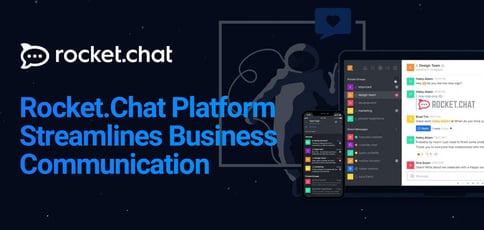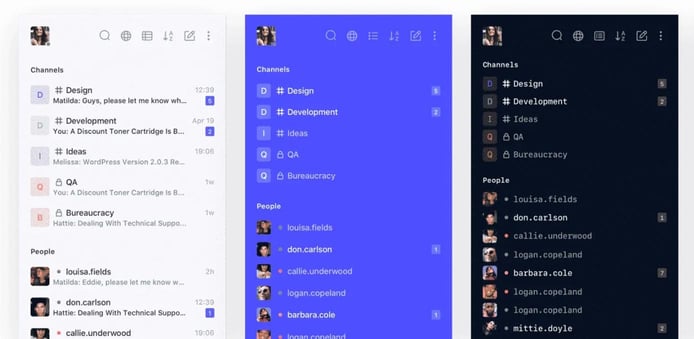
TL; DR: Rocket.Ch
Rocket.Chat is an open-source communications platform that puts team collaboration tools alongside customer-facing chat, email, video, and audio apps. That helps businesses streamline all their communications in one interface, and they can adapt Rocket.Chat’s open-source software to meet their specific needs.at provides users full access to its code, and it has an active community of more than 1,500 developers. Many enterprise clients trust Rocket.Chat and its cloud-hosted and on-prem solutions to enhance their support and drive customer satisfaction.
onShore Security, a small cybersecurity firm, offers 24/7 real-time monitoring, correlation, and organization-wide network data security analysis. Among its clients are large banks and enterprise institutions that turn to onShore Security for its extensive expertise, including its recommendations for the communication platforms they should use.
When onShore recently switched communication providers because of a problem with data persistence and security, it had two non-negotiable demands for its next communications platform. It would have to offer hosting on-prem, and it needed to be open-source with an active community and commercial support.

Rocket.Chat helps streamline internal business communication and customer support.
Rocket.Chat was the clear choice for onShore because of its ease of use, open-source, and facilitation of hosting on-prem that offers complete control over security and functionality. Rocket.Chat quickly centralized onShore’s communications and helped it stay on top of deadlines and up to date on projects.
Rocket.Chat is an open-source, all-in-one communications platform that puts internal and external communications all in one interface. Rocket.Chat’s underlying code allows companies to build unique communication solutions for their teams and customers.
“The whole idea was to make a tool that was not just for team communication but also for client interactions. We wanted to have this mix between Slack and ZenDesk where teams could collaborate but then also respond and connect with customers,” said Gabriel Engel, Rocket.Chat Founder and CEO. “And by making our platform open-source, we could allow for any integration imaginable.”
Rocket.Chat has a community of more than 1,500 developers and 300,000-plus paying users and over 10 million total users. The company offers many of its communication solutions for free, and, because its software is open-source, businesses can use its code to build custom solutions.
When companies need complete control of their communications and they’re selective about their security needs and integrations, open-source software is the preferred solution. Rocket.Chat offers a robust open-source platform with an active community, and unlimited configurations.
Open-Source Software Gives Users Control of Data Security
Since the COVID-19 pandemic began, the FBI estimates that cyberattacks are up 400%. Part of the reason is that a significant portion of the workforce has transitioned to remote work for the foreseeable future. But many companies haven’t upgraded their security features to deal with these changes.
Security companies, including onShore, understand that cybercriminals will try to find their weakest entry point, so they focus on patching every single gap. Medical and financial professionals also realize that data security is essential to their survival. Not only do companies need to eliminate the risk of breaches, but consumers are starting to choose companies based on how seriously they take data protection.
Rocket.Chat offers total control over the software, so instead of trusting that the software company is taking data security seriously, they can control it for added peace of mind.
And Rocket.Chat’s software offers a host of other benefits, according to Gabriel.
“It offers total privacy, so you control the data, and omnichannel tools to integrate everything and have all of your business communication on one platform,” Gabriel said. “Some like Rocket.Chat because of its usability, privacy control, or because it is an open-source platform, so it is unique for every user.”
In addition to cloud-hosting, companies can host the platform on-prem and control their code and functionality. That also means they don’t have to worry about 10 different communications apps with security flaws.
Customer and Internal Communication on One Platform
Many businesses are still stuck in the world of email and inboxes cluttered with internal memos while impatient customers wait for answers. A company may have the right email solution but no way to integrate that between its departments.
Modern companies need to remove barriers between departments and communicate as one team to maintain efficiency. But much of the problem is in the communications technology departments use. Enterprise companies may have rules governing which departments need to collaborate and how often groups should meet. But that often stalls essential tasks because employees can’t connect with the right department to solve problems in real time.

Rocket.Chat streamlines chat threads so users can find relevant conversations quickly.
“There are different solutions for talking with customers and different solutions for talking with teams. But Rocket.Chat is one powerful agent that accomplishes both and works alongside all the apps that people are already using,” Gabriel said.
Companies often use one app for customer-facing questions and another for internal communications. But with Rocket.Chat, teams can organize both channels and communicate together about a specific customer’s concern. And the person who responds doesn’t have to go into a different app.
Teams can start working together instead of finding themselves at cross-purposes. The third-largest bank in Brazil recently chose Rocket.Chat to streamline its internal and external communications — and the institution increased its efficiency by 80%. The bank estimates that the switch to Rocket.Chat helped it recover approximately $100 million in the last nine months of 2019.
Rocket.Chat: Making Sense of the Chaos by Organizing Conversations
Rocket.Chat empowers businesses to build customized communications solutions to meet their unique needs. And instead of having one conversation that contains every interaction between two parties, Rocket.Chat breaks it up into manageable pieces and organizes them based on theme.
“We’re trying to bring a little more organization to chaos,” Gabriel said.
The point of any communications platform is to make things simpler and to bring people closer together. And Rocket.Chat understands the importance of written records, especially on a corporate level, for standardization, training, and even legal reasons. Rocket.Chat helps with those issues by streamlining conversation threads so users can find information quickly.
Open-source platforms are uniquely equipped to source feedback because they empower their users. If companies wait years to respond to customer concerns and only change because they’ve sustained losses year over year, they may not survive in the modern corporate landscape.
“Because it’s open-source, the user base can be quite vocal, and they can actually change the product themselves. A lot of things in Rocket.Chat have been built by the community,” Gabriel said. “We have about 1,500 active users that have contributed code to RocketChat. It’s a dynamic development process where developers and users are highly engaged.”
Rocket.Chat continues to evolve as communication becomes more vital. And because each business can choose its own version of Rocket.Chat through cloud-hosted or on-prem solutions, there’s no need to wait for software updates or customizations. That power is already in the hands of its users.
HostingAdvice.com is a free online resource that offers valuable content and comparison services to users. To keep this resource 100% free, we receive compensation from many of the offers listed on the site. Along with key review factors, this compensation may impact how and where products appear across the site (including, for example, the order in which they appear). HostingAdvice.com does not include the entire universe of available offers. Editorial opinions expressed on the site are strictly our own and are not provided, endorsed, or approved by advertisers.
Our site is committed to publishing independent, accurate content guided by strict editorial guidelines. Before articles and reviews are published on our site, they undergo a thorough review process performed by a team of independent editors and subject-matter experts to ensure the content’s accuracy, timeliness, and impartiality. Our editorial team is separate and independent of our site’s advertisers, and the opinions they express on our site are their own. To read more about our team members and their editorial backgrounds, please visit our site’s About page.



